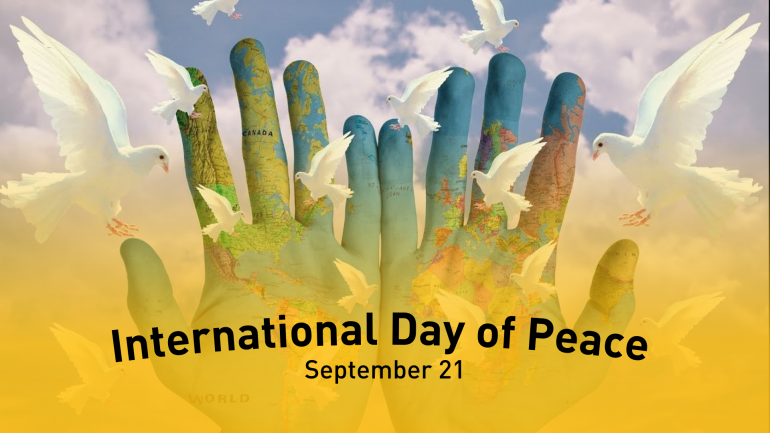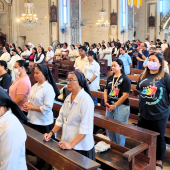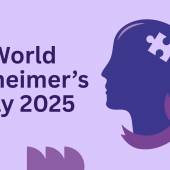International Day of Peace

Peace involves creating a world where people are treated equally regardless of their race or any other category. We all have a role to play in fostering peace in our families, communities, and countries. Peace is the language we must speak for the common good and the growth of human development.
The purpose of the day was, and remains, to strengthen the ideals of peace around the world despite the many challenges and conflicts that continue to dominate the world.
Without peace, it will not be possible to achieve the levels of trust, cooperation, and inclusiveness that are needed for societies to be resilient to shocks, manage disputes, and adapt to changes in their environments.
Each year, the International Day of Peace is observed around the world on September 21. The UN General Assembly has declared this as a day devoted to strengthening the ideals of peace by observing 24 hours of non-violence and a cease-fire.
But achieving true peace entails much more than laying down arms. It requires the building of societies where all members feel that they can flourish and contribute to the common good. It involves creating a world in which people are treated equally, regardless of their race or any other differences.
The United Nations invites all countries and peoples to honor a cessation of hostilities during the day and to commemorate it through education and public awareness on issues related to peace.
History says that, following the Pope's announcement, the first World Day of Peace was celebrated on January 1, 1968. Inspired by the Catholic World Day of Peace, the United Nations-sponsored International Day of Peace began in 1981.
Later The International Day of Peace ("Peace Day") was observed around the world in 1981 by a unanimous United Nations resolution. Peace Day provides a globally shared date for all humanity to commit to peace above all differences and to contribute to building a culture of peace.
The 2022 theme for the International Day of Peace is "End racism. Build peace." We invite you to join the efforts of the United Nations as we work towards a world free of racism and racial discrimination and a world where compassion and empathy overcome suspicion and hatred.
Pope Francis said, "Peace is a precious gift, which must be promoted and protected. Never has the use of violence brought peace in its wake. War begets war; violence begets violence."
In his 2022 World Peace Day message, entitled "Dialogue between generations, education, and work: tools for building lasting peace," Pope Francis called for more investment in education and less in weaponry.
Pope Francis outlined three "paths for building a lasting peace": promoting dialogue between generations; investing in education, and improving labor conditions.
In the message published Dec. 21, the pope said the world had witnessed a "significant reduction" in education funding in recent years, while military spending had soared beyond Cold War levels.
"It is high time, then, that governments develop economic policies aimed at inverting the proportion of public funds spent on education and weaponry," he wrote in the message, signed on Dec. 8, the Solemnity of the Immaculate Conception.
On this day, we can observe through organizing peace workshops, engaging in feasts that bring people together for peace, putting up peace poles, and engaging in peace activities that bring people together.
An activity that is common among people observing this day is the one-minute silence that is observed at noon across all time zones. This activity was started to create a "Peace Wave’ that moves around the globe.
The value of peace is in the form of caring, respecting others, and tolerating. In addition, some behaviors did not reflect the value of peace, such as unfair treatment, discrimination, being uncooperative, not accepting differences, and violating the rules.
Let's work together for a peaceful world and stay in peace. Let’s become instruments and catalysts of peace, as Saint Francis of Assisi would say.
Radio Veritas Asia (RVA), a media platform of the Catholic Church, aims to share Christ. RVA started in 1969 as a continental Catholic radio station to serve Asian countries in their respective local language, thus earning the tag “the Voice of Asian Christianity.” Responding to the emerging context, RVA embraced media platforms to connect with the global Asian audience via its 21 language websites and various social media platforms.














